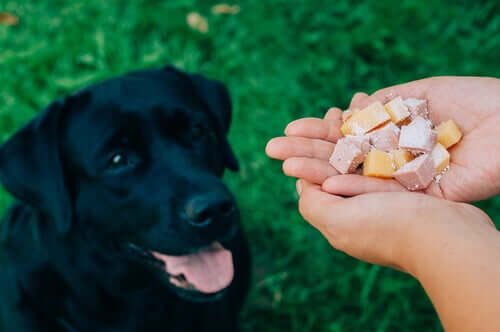The Best Diet for Dogs With Sensitive Skin


Written and verified by the lawyer Francisco María García
Just like humans, there are some dogs that have sensitive skin. If your dog is showing signs of sensitivity to some internal or external element, then you’ll need to figure out the most likely cause. That’s especially true for dogs with sensitive skin, and you’ll need to rule out everything from its diet to the plants in and around your home.
The reason for that is that the most common cause of this kind of thing is allergies. But, when a dog can’t get down a specific food, or has some kind of negative reaction to it, you’ll immediately start to notice the symptoms.
Symptoms of food allergy

Here are the most common symptoms:
- Hives
- Itchiness
- Dry or scaly skin
- Excessive shedding, to the point that there are spots with no fur at all
- Loss of glow in its fur
These allergy symptoms are almost always the result of eating the wrong kind of food. That makes it extremely important to figure out exactly what food is causing the problem. Your vet can help you with that. They’ll start by asking you for a list of all the things your dog has eaten over the past few days.
Prevention and treatment
You can get rid of your dog’s symptoms with a healthier diet. That has partly to do with the fact that your dog will have a stronger body, which also means it’ll have a better quality of life. Higher-quality foods tend to be the healthiest when it comes to dogs.
A proper diet for dogs with sensitive skin and allergies
Here are some important tips to create a balanced diet for dogs with sensitive skin:
- Include fatty acids. The food should have omega 3 and 6 fatty acids. In other words, it needs to have fish oils.
- Our suggestion is to pick out a food that has a single protein source, and a single carbohydrate source.
- Include all the vitamins involved in keeping a dog’s fur and skin healthy.
- It doesn’t matter how you give your dog the food, so long as you keep in mind all the things we just mentioned. Basically, the most important thing is that it has a diet with all the proper nutrients.
Veterinarian-developed diet
You should take your dog to the vet if its symptoms are serious and last for a long time. That could be a sign of a more serious illness.
In allergy cases, most vets will develop a strict diet for your dog. They’ll get rid of any foods with even the slightest chances of causing problems. That diet will usually have to go on for about 8 months to get proper results. It can even take up to 10 weeks just for your dog’s symptoms to go away.
Once you’ve gotten your dog on the diet, you need to be extra careful of what you let it eat. If you want to introduce something new, you have to do that a little bit at a time. Your vet can help you with that too, by tracking which foods work and don’t work for your dog and developing a more effective plan.
Parasites
You’ll also need to check your dog for parasites, fleas, and ticks. These are often the real cause of your dog’s sensitive skin, and not poor nutrition or allergies. For one thing, you should always keep your dog’s skin and fur clean. That makes it much easier to keep track of its body and make sure nothing harmful has latched onto it.
Breed considerations
Some breeds of dog develop sensitive skin more easily than others. For example, wrinkly dogs like Shar-Peis are much more likely to have this problem. Hairless and short-haired dogs are also more likely, because of the higher level of exposure.
You should also remember that the symptoms we mentioned above aren’t necessarily a sign of an allergy or an illness. In some cases it’s just a lack of a certain nutrient. If that’s the problem, it’s easy to solve by rounding out your dog’s diet and making it healthier.
Things like dairy products, grains, and corn are all good options. They tend NOT to cause a negative reaction on a dog’s skin.
Other important precautions for dogs with sensitive skin

If you have a dog with sensitive skin, there are some other things you should keep in mind:
- Avoid the beach. The summer sun can be extremely damaging to a dog’s skin.
- Exercise more. Exercise is almost always helpful for dogs, and this is another one of those times.
- Make sure you’re giving your dog high-quality food. If possible, find a type that’s specifically made to help with sensitive skin.
Just like humans, there are some dogs that have sensitive skin. If your dog is showing signs of sensitivity to some internal or external element, then you’ll need to figure out the most likely cause. That’s especially true for dogs with sensitive skin, and you’ll need to rule out everything from its diet to the plants in and around your home.
The reason for that is that the most common cause of this kind of thing is allergies. But, when a dog can’t get down a specific food, or has some kind of negative reaction to it, you’ll immediately start to notice the symptoms.
Symptoms of food allergy

Here are the most common symptoms:
- Hives
- Itchiness
- Dry or scaly skin
- Excessive shedding, to the point that there are spots with no fur at all
- Loss of glow in its fur
These allergy symptoms are almost always the result of eating the wrong kind of food. That makes it extremely important to figure out exactly what food is causing the problem. Your vet can help you with that. They’ll start by asking you for a list of all the things your dog has eaten over the past few days.
Prevention and treatment
You can get rid of your dog’s symptoms with a healthier diet. That has partly to do with the fact that your dog will have a stronger body, which also means it’ll have a better quality of life. Higher-quality foods tend to be the healthiest when it comes to dogs.
A proper diet for dogs with sensitive skin and allergies
Here are some important tips to create a balanced diet for dogs with sensitive skin:
- Include fatty acids. The food should have omega 3 and 6 fatty acids. In other words, it needs to have fish oils.
- Our suggestion is to pick out a food that has a single protein source, and a single carbohydrate source.
- Include all the vitamins involved in keeping a dog’s fur and skin healthy.
- It doesn’t matter how you give your dog the food, so long as you keep in mind all the things we just mentioned. Basically, the most important thing is that it has a diet with all the proper nutrients.
Veterinarian-developed diet
You should take your dog to the vet if its symptoms are serious and last for a long time. That could be a sign of a more serious illness.
In allergy cases, most vets will develop a strict diet for your dog. They’ll get rid of any foods with even the slightest chances of causing problems. That diet will usually have to go on for about 8 months to get proper results. It can even take up to 10 weeks just for your dog’s symptoms to go away.
Once you’ve gotten your dog on the diet, you need to be extra careful of what you let it eat. If you want to introduce something new, you have to do that a little bit at a time. Your vet can help you with that too, by tracking which foods work and don’t work for your dog and developing a more effective plan.
Parasites
You’ll also need to check your dog for parasites, fleas, and ticks. These are often the real cause of your dog’s sensitive skin, and not poor nutrition or allergies. For one thing, you should always keep your dog’s skin and fur clean. That makes it much easier to keep track of its body and make sure nothing harmful has latched onto it.
Breed considerations
Some breeds of dog develop sensitive skin more easily than others. For example, wrinkly dogs like Shar-Peis are much more likely to have this problem. Hairless and short-haired dogs are also more likely, because of the higher level of exposure.
You should also remember that the symptoms we mentioned above aren’t necessarily a sign of an allergy or an illness. In some cases it’s just a lack of a certain nutrient. If that’s the problem, it’s easy to solve by rounding out your dog’s diet and making it healthier.
Things like dairy products, grains, and corn are all good options. They tend NOT to cause a negative reaction on a dog’s skin.
Other important precautions for dogs with sensitive skin

If you have a dog with sensitive skin, there are some other things you should keep in mind:
- Avoid the beach. The summer sun can be extremely damaging to a dog’s skin.
- Exercise more. Exercise is almost always helpful for dogs, and this is another one of those times.
- Make sure you’re giving your dog high-quality food. If possible, find a type that’s specifically made to help with sensitive skin.
This text is provided for informational purposes only and does not replace consultation with a professional. If in doubt, consult your specialist.








